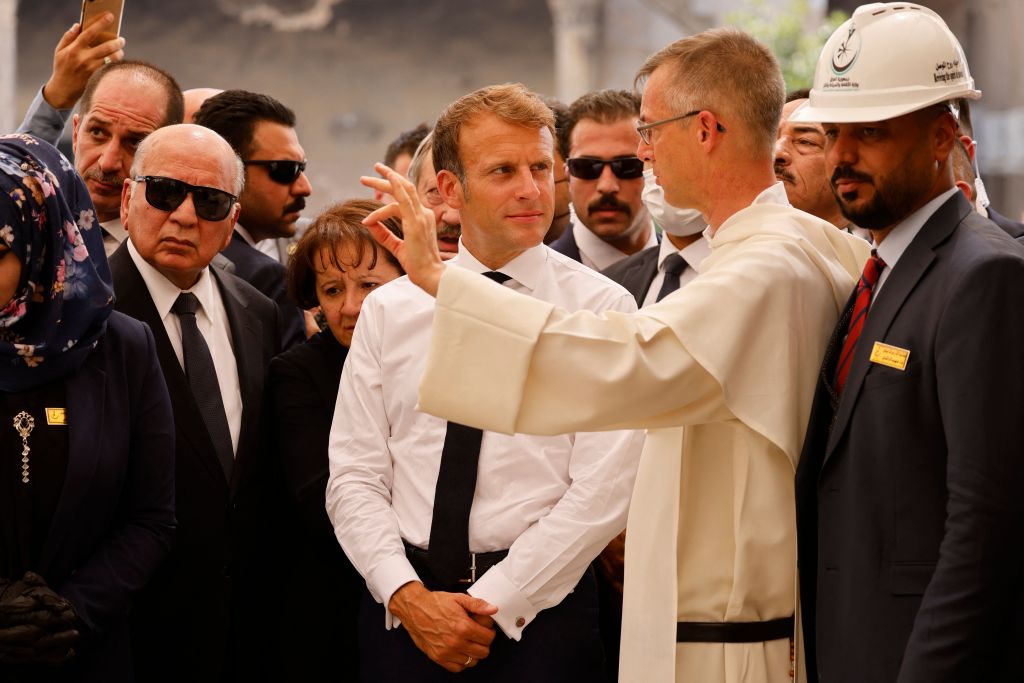Alwaght- Baghdad Conference for Cooperation and Partnership was held in the Iraqi capital on August 28, and among the participants Emmanuel Macron as the president of one of the world powers grabbed the attention. But Macron's presence in Iraq certainly came with goals going beyond the agenda of one-day Baghdad conference.
France eyeing to restore traditional place, economic interests
Macron was the only leader of a non-regional power to attend the summit. Paris is working to rebuild its once-massive presence and position in West Asia and North Africa. The European power in recent years has been engaged in wars in Africa— Libya, Mali, and Central African Republic— but recently turned into a diplomatic force in West Asia. Although it has been successful in realizing its economic interests in West Asia, some of its hasty and radical policies, for example towards Syria and Iran, made achieving its goals incomplete. Since late years of François Hollande presidency, France decided to set new policies with consideration of the various Asian regions. The central focus of Macron has been restoring French glory President Charles de Gaulle dreamed of, though there are some differences in tactics and strategies.
Macron examines some of the failed policies of France in last decades and tries to reverse them by adopting multilateralism as a general and successful policy in the form of alignment with the US and the European Union in different parts of the world, especially in West Asia. Meanwhile, the US withdrawal from Europe and West Asia and the indifference among European countries is creating a strategic vacuum. Paris is seeking ways to preserve independence in the defense policy and also fill the vacuum. He once said that regional powers know how to turn the vacuum left by the US into their privilege. Motivated by this mindset, since last summer the European country began to counter Turkish military and political presence in Libya and the Iranian sway in Lebanon.
Macron; a savior or terrorism sponsor?
While the French leader tries to play as savior and supporter of Iraq in the fight against terrorism, all hallmarks, including the past French actions, speak against this gesture. Perhaps the most important reason to dismiss the French and Western slogans about counterterrorism policy is the remarks made to Macron by Nicodemus Daoud Sharaf, Syriac Orthodox Archbishop of Mosul, during the meeting with Iraqi church leaders in Mosul.
"As you asked me questions, I ask you some. ISIS came to Mousl…they attacked Mosul in broad daylight, not at night, in front of the eyes of the whole world and the satellites that constantly watch Iraq. Is it wise to believe that ISIS was not stoppable before reaching Mosul? They reached Mosul, displaced us to the villages and two months later forced us out from villages. Is it wise to believe that nobody saw them or the big countries could not stop them?" he told the French leader who trumpeted about Western support for Iraq.
These questions of a Christian religious leader disclose the real nature of Macron and Western claims about fighting terrorism. When ISIS was running rampant in Iraq and reached Baghdad gates, Paris and its Western allies sponsored terrorism with their silence and even secret military and intelligence assistance to the group. Paris’ bid to paint itself as supporters of Iraq after end of the ISIS caliphate is just demagogic and for own interests.
One of the other issues that questioned the true will of Paris to fight terrorism is blocking invitation of Syria to the conference. Reports suggest that the main obstacle behind not inviting legitimate Syrian government to the summit was Macron and his government. This is coming whereas over the past decades Damascus was a forerunner in combating foreign-backed terrorism, especially ISIS and the Syrian nation paid the highest cost battling takfiri terrorists sponsored by West and reactionary Arab regimes who were not afraid to say they bankrolled militant fighters in Syria to topple President Bashar al-Assad.
There is no doubt that if one state stands out as the king of the anti-ISIS fight, it is Syria. Despite all the sacrifices of Syria and other branches of the Axis of Resistance, an Iran-led bloc favoring regional states' independence, the West is sanctioning the Syrian government in boost to terrorists. Macron's push against Syria presence at the conference once again repeated a fact: The West still stands in the pro-terrorism camp and its beautiful words about fighting terrorism are simply lies.
Macron's failed regional show
But Macron's I'm-your-savior show is failed and devoid of concrete fruits. Now, it is covered to no one that Macron's arrangements over the past two years to solve the Lebanese crisis and get things back on the track not only failed to make good for Lebanon but also deepened the crisis there. Additionally, the French military presence in Syria to back the Kurdish-majority Syrian Democratic Forces (SDF) is doomed to fail in near future as Damascus restores rule over more territories and the north, where Kurdish militias hold regions, is no exception. After all, the US Afghanistan withdrawal showed the Western powers have no plan for long-term stay in the region, and the same scenario will be repeated in Syria. France is unable to act independently and alone in Syria and a big defeat is inescapable for Paris.
All field realities prove that the French struggle to rebuild its influence in West Asia using counterterrorism, pro-stability, and freedom of navigation slogans practically lack a supporting stone and actually Paris cannot do anything in the region independent of Western allies.



























